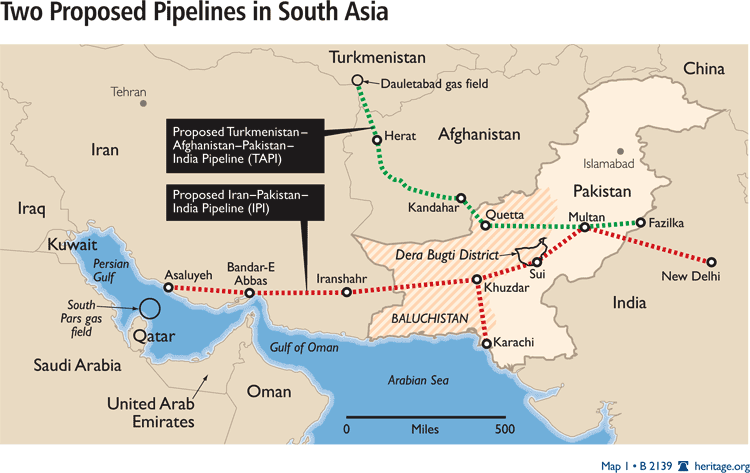The Deepening Iran-Pakistan Petro-Relationship

The Iran-Pakistan branch of the Iran-Pakistan-India gas pipeline (IPI) seems to be coming online. Pakistani President Asif Ali Zardari has announced he will visit Iran for the groundbreaking of the Pakistan branch of a new gas pipeline on March 11. It will be his second visit to Iran in less than a month, part of a deepening petro-relationship that is worrying the United States.
The pipeline is controversial, to say the least, in the US. The State Department has threatened Pakistan with sanctions for dealing with the regime in Iran, offering a electrification projects to replace any sort of benefit Pakistan would get from the petro-deal.
The challenge facing Islamabad is that it is next door to Iran, while the U.S. is not. In the long-run, it is not in their interest to remain at loggerheads with Tehran even if the U.S. wants them to be. In his press statements, foreign ministry spokesman Moazzam Ahmad Khan has been open about this. “Yes, we know about their concerns but hope our friends, including the US, will understand our economic compulsions,” said Khan.
Iran has already proposed building a new oil refinery near the Pakistani port of Gwadar.
The Pakistan-Iran pipeline is separate from a larger regional project to link India with the natural gas fields of Turkmenistan through Afghanistan and Pakistan (the so-called TAPI pipeline, or Trans-Afghanistan pipeline) . It is a goal that has been lurking in the back rooms of the energy industry since the 1990s: how can one efficiently extract and export the vast energy wealth of the Caspian region without going through Russia or China?
Two decades ago Argentina-based Bridas and Texas-based Unocal were in bitter competition for who would get the Taliban’s permission to build a pipeline across Afghanistan. Bridas came close to signing a deal, but pulled out a year later. Unocal actually brought a Taliban delegation to visit the Texas homes of its executives. Unocal eventually pulled out when the Taliban made unreasonable demands.998, Unocal also pulled out when crashed oil prices combined with international opprobrium over the Taliban’s human rights record and terrorism made the deal too difficult to finalize.
The Asia Development Bank has been pushing TAPI for years, though the insecurity in Afghanistan remains a constant barrier to anything concrete coming to pass.
While TAPI languishes in development hell, Pakistan and Iran have pushed forward with their own pipeline.From Iran’s perspective, anything that gives them an economic connection with the region and is outside the regulatory reach of the U.S. government is a boon. From Pakistan’s perspective, too, the prospect of getting income and energy without U.S. strings attached is deeply attractive.
What can the U.S. do? Apart from levying additional sanctions on Iran and possibly cutting Pakistan off from some aid projects, the U.S. doesn’t have much leverage to apply here. At least until the last conventional combat troops withdraw from Afghanistan, the U.S. is relying on Pakistan to keep the supply lines open, which gives them the advantage in the relationship.
The I-P pipeline is another indication that America’s capacity to influence, bend, and shape south Asia to its will is degrading yet further. The strategy in Afghanistan, which was never really much of one, had as its critically weak center the relationship with Pakistan. Until the withdrawal is complete, American options for throwing its weight around in the region will take a backseat to making sure everyone — and everything — can be withdrawn safely.
American antagonism toward Iran is common knowledge. But anger toward Pakistan is growing in Washington. In conversations with policymakers and Congressional staff, there is a clear, and growing, frustration with Pakistan’s decisions: funding the insurgency in Afghanistan along with other terror groups, the constant brinksmanship with India, the failure to find Osama bin Laden up the road from their premier military academy, and its increasingly cozy relationship with Iran. After the bin Laden raid in particular, there was open talk of simply cutting them off entirely — though, once again, that would have imperiled American efforts in Afghanistan.
Once the withdrawal from Afghanistan is more or less complete, there will be a turning point in the U.S.-Pakistan relationship. Where it will turn is reliant upon Pakistan as much as it is the U.S.: few here think the country is unimportant, but whether the relationship becomes a warm collaborative one or an increasingly bitter frenemy one pivots on Islamabad’s decisions over the next year. This new pipeline with Iran probably suggests where the relationship is ultimately headed: back to crisis.